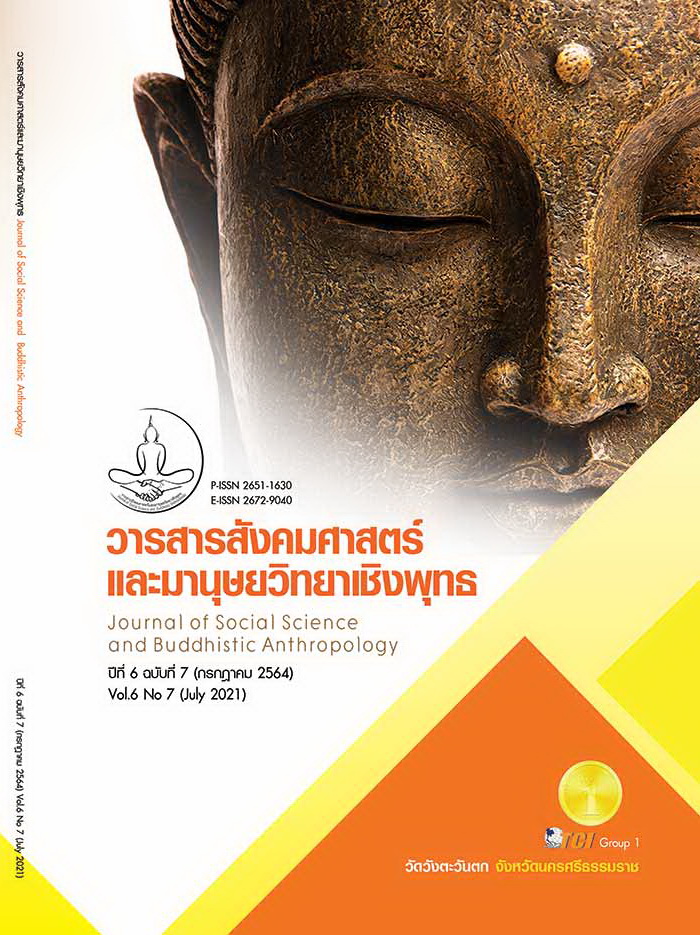DRIVING THE SUFFICIENCY ECONOMY IN THE SUSTAINABLE ECONOMIC DEVELOPMENT OF THE COMMUNITY FOUNDATION ECONOMIC A CASE STUDY OF BAN NOENTAN, MOO 6, TAMBON SUEAHOKE, AMPHOE MUEANG, CHAI NAT
Keywords:
Driving Economy, Sufficiency Economy, Foundation Economic Sustainable of Community, Ban Noentan Chai Nat ProvinceAbstract
The objectives of this research article were to 1) The process of driving the sufficiency economy in the sustainable development of the community's foundational economy. 2) Develop a model to drive the sufficiency economy. 3) Propose a model to drive the sufficiency economy. Using a qualitative research model. Key contributors are community leaders both governmental and local 25 people. Using a purposive sampling method. The research tool was interviewed. Method of descriptive data analysis. The results revealed that; 1) The process of driving the sufficiency economy in sustainable community-based economic development. Are as follows 1.1) Learning on plan working in the village is planned. 1.2) To drive the community economy. There is an activity to reduce expenses and generate income. 1.3) Management of natural resources environment. 1.4) Good health physical and mental. 1.5) Management develop on a participatory basis. 1.6) People development and encourage everyone in the community to develop skills and knowledge. 2) Development of sufficiency economy driving model in sustainable community based economy. Are as follows 2.1) Way of life have a simple way of life. 2.2) Thinking system rationality systematic thinking and integrated thinking. 2.3) Develop seek guidelines to develop oneself and society. 2.4) Knowledge received all the time. 2.5) Moral integrity generous have a public mind. 3) Sufficiency economy driving model for sustainable community foundational economic development. Present the form as follows 3.1) Access to factors of production make the most of available resources. 3.2) Building knowledge obtain knowledge from the government. 3.3) Marketing strategic plans with government agencies. 3.4) Management there is a join management of the community.
References
กรมการพัฒนาชุมชน. (2559). คู่มือปฏิบัติการเศรษฐกิจพอเพียงในชุมชนเพื่อยกระดับรายได้ ครัวเรือน. กรุงเทพมหานคร: กรมการพัฒนาชุมชน.
คณะทำงานการพัฒนาเศรษฐกิจฐานรากและประชารัฐ. (2559). สานพลังประชารัฐ. กรุงเทพมหานคร: อมรินทร์พริ้นติ้งแอนด์พับลิซชิ่ง.
จีรจิต ทองสีขาว. (2553). ผลลัพธ์การขับเคลื่อนเศรษฐกิจพอเพียงบ้านบุรีรัมย์ ตำบลในวงใต้ อำเภอละอุ่น จังหวัดระนอง. ใน วิทยานิพนธ์รัฐประศาสนศาสตรมหาบัณฑิต สาขาวิชาการบริหารทั่วไป. มหาวิทยาลัยบูรพา.
ทองทิพภา วิริยะพันธ์. (2553). เศรษฐกิจพอเพียง ความพอเพียงมวลรวมในประเทศ. กรุงเทพมหานคร: G.P. CYBERPRINT.
เพ็ญพร ชำนาญพันธ์. (2555). การจัดการเศรษฐกิจครัวเรือนโดยหลักเศรษฐกิจพอเพียงของชาวนากรณีศึกษาบ้านโนนแดง ตำบลบุ่งคล้า อำเภอหล่มสัก จังหวัดเพชรบูรณ์. ใน วิทยานิพนธ์รัฐประศาสนศาสตรมหาบัณฑิต สาขาวิชานโยบายสาธารณะ. มหาวิทยาลัยนเรศวร.
มูลนิธิชัยพัฒนา. (2563). องค์ประกอบของเศรษฐกิจพอเพียง. เรียกใช้เมื่อ 30 ธันวาคม 2563 จาก http://www.chaipat.or.th/site_content/34-13/3579-2010-10-08-05-24-39.html
วิทยา อธิปอนันต์. (2552). เศรษฐกิจพอเพียงเพื่อการเกษตรที่พึ่งพาตนเอง. กรุงเทพมหานคร: กรมส่งเสริมการเกษตร.
ศิลวัต ศรีสวัสดิ์. (2554). ความรู้ความเข้าใจปรัชญาของเศรษฐกิจพอเพียงของผู้ที่มีภูมิลำเนาในเขตกรุงเทพมหานคร. ใน วิทยานิพนธ์วิทยาศาสตรมหาบัณฑิต สาขาวิชาการจัดการสิ่งแวดล้อม. สถาบันบัณฑิตพัฒนบริหารศาสตร์.
สมศักดิ์ ศรีสันติ. (2556). การเปลี่ยนแปลงสังคมและวัฒนธรรม. ขอนแก่น: มหาวิทยาลัยขอนแก่น.
สํานักงานคณะกรรมการเศรษฐกิจและสังคมแห่งชาติ. (2558). คณะอนุกรรมการขับเคลื่อนเศรษฐกิจพอเพียง เศรษฐกิจพอเพียงคืออะไร. กรุงเทพมหานคร: สำนักงานคณะกรรมการเศรษฐกิจและสังคมแห่งชาติ.
สุชีรา ธนาวุฒิ และคณะ. (2560). การสังเคราะห์องค์ประกอบปรัชญาของเศรษฐกิจพอเพียงไปปฏิบัติจริงในการพัฒนาธุรกิจ. วารสารวิทยาลัยพาณิชยศาสตร์บูรพาปริทัศน์, 12(1), 46-57.
เสรี พงศ์พิศ. (2555). แผนที่ชีวิต เข็มทิศชุมชน. กรุงเทพมหานคร: พลังปัญญา.









